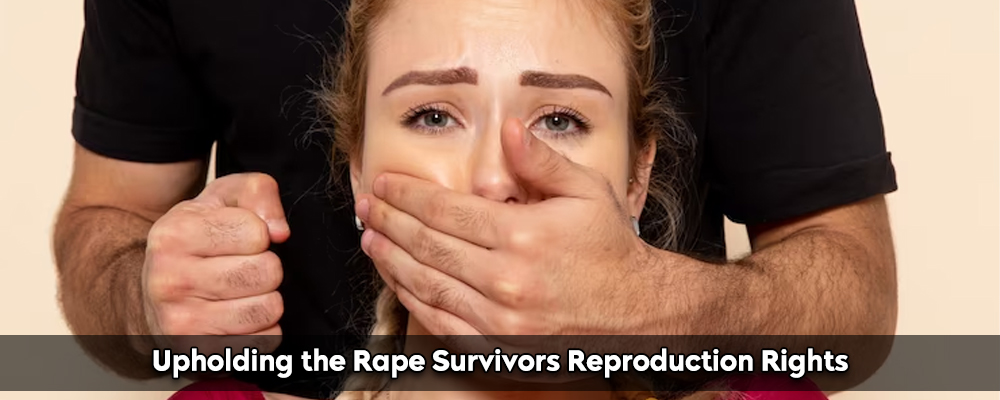For far too long, the issue of forced birth for rape survivors has been a painful reality, exacerbating the trauma they have endured. However, society is gradually recognizing the importance of upholding the reproductive rights and autonomy of these survivors. By examining the physical, emotional, and ethical dimensions of the issue, people should raise awareness and advocate for a more compassionate and empowering approach to supporting rape survivors.
Need A Legal Advice
The internet is not a lawyer and neither are you. Talk to a real lawyer about your legal issue

Struggles Faced by Rape Survivors
The struggles faced by rape survivors are as follows-
- Profound physical, psychological, and emotional trauma resulting from the heinous act of rape.
- Fear, shame, and a sense of violation that lingers long after the assault.
- Potential development of post-traumatic stress disorder (PTSD) and other mental health issues.
- Emotional turmoil and difficulty in forming trusting relationships.
- Social stigma and victim-blaming attitudes that can further isolate survivors.
- Challenging legal processes and navigating the justice system.
- Unplanned pregnancy as a consequence of the assault, adding an additional layer of complexity and emotional distress.
- Having to make difficult decisions about whether to continue with the pregnancy or pursue abortion.
- Internal conflicts and societal pressures regarding the responsibility of raising a child conceived through rape.
- Lack of access to comprehensive support services, including counselling, healthcare, and legal assistance.
- Potential re-traumatization when facing judgment, scepticism, or disbelief from others when disclosing the assault.
- On-going need for healing, recovery, and rebuilding a sense of self and trust in the world.
In addition to the immediate trauma, rape survivors may find themselves confronted with an unplanned pregnancy resulting from the assault. The very notion of being forced to bear and raise a child conceived through rape is a profound violation of a survivor’s rights and personal autonomy.
Role of Judiciary: Allahabad High Court
- In the case of Ms X v State Of U.P. and 4 others, the Allahabad High Court’s judgment rests on the principles of justice, autonomy, and the fundamental rights enshrined in the Indian Constitution. The court recognized that forcing a rape survivor to bear the child of her assailant not only violates her autonomy but also inflicts severe mental trauma, perpetuating the agony she has already suffered.
- The court recognized that the right to a dignified life encompasses the right to be free from the burden of an unwanted pregnancy resulting from rape. Forced pregnancy compromises a survivor’s fundamental rights, as consent given under sexual assault cannot be considered voluntary consent for procreation.
Implications and Significance
- The Allahabad High Court’s judgment has significant implications for rape survivors’ reproductive rights in India, establishing a precedent that reflects society’s evolving understanding of the profound impact of sexual assault on their lives and aligning the legal landscape accordingly.
- The ruling recognizes the complexity and sensitivity of rape and pregnancy cases, advocating for a victim-centered approach. By affirming survivors’ right to choose, the court empowers them to regain control and initiate the healing process.
- The judgment delivers a strong message to society, confronting stigma and victim-blaming culture surrounding sexual assault. It underscores the significance of empathy, support, and creating a conducive environment for survivors’ recovery and well-being.
The Way Forward: Empowerment and Support
- To end the injustice of forced birth for rape survivors, a comprehensive approach is required. It starts with acknowledging and challenging the prevailing societal attitudes and misconceptions surrounding rape and abortion. Education and awareness campaigns can help dispel myths, reduce stigma, and foster empathy towards survivors.
- Legal frameworks must be reformed to ensure that survivors have access to safe and legal abortion services, free from unnecessary restrictions. Healthcare providers should receive training to approach survivors with sensitivity, compassion, and trauma-informed care.
- Additionally, Holistic support services such as counselling, therapy, and support groups play a crucial role in aiding survivors’ healing process. Comprehensive aftercare, including reproductive healthcare and long-term support, helps survivors rebuild their lives and move forward.
Conclusion
Forced birth for rape survivors represents a violation of their autonomy, dignity, and well-being. It is imperative that society confronts this injustice and works towards comprehensive change. By advocating for the rights and reproductive autonomy of survivors, we can foster a more compassionate and just society that uplifts and supports those who have already endured unimaginable pain
One can talk to a lawyer at Lead India for any kind of legal advice. In India, free legal advice online is available by Lead India. Along with getting free legal advice online, you can ask questions to experts online free at Lead India.





 Talk to a Lawyer
Talk to a Lawyer